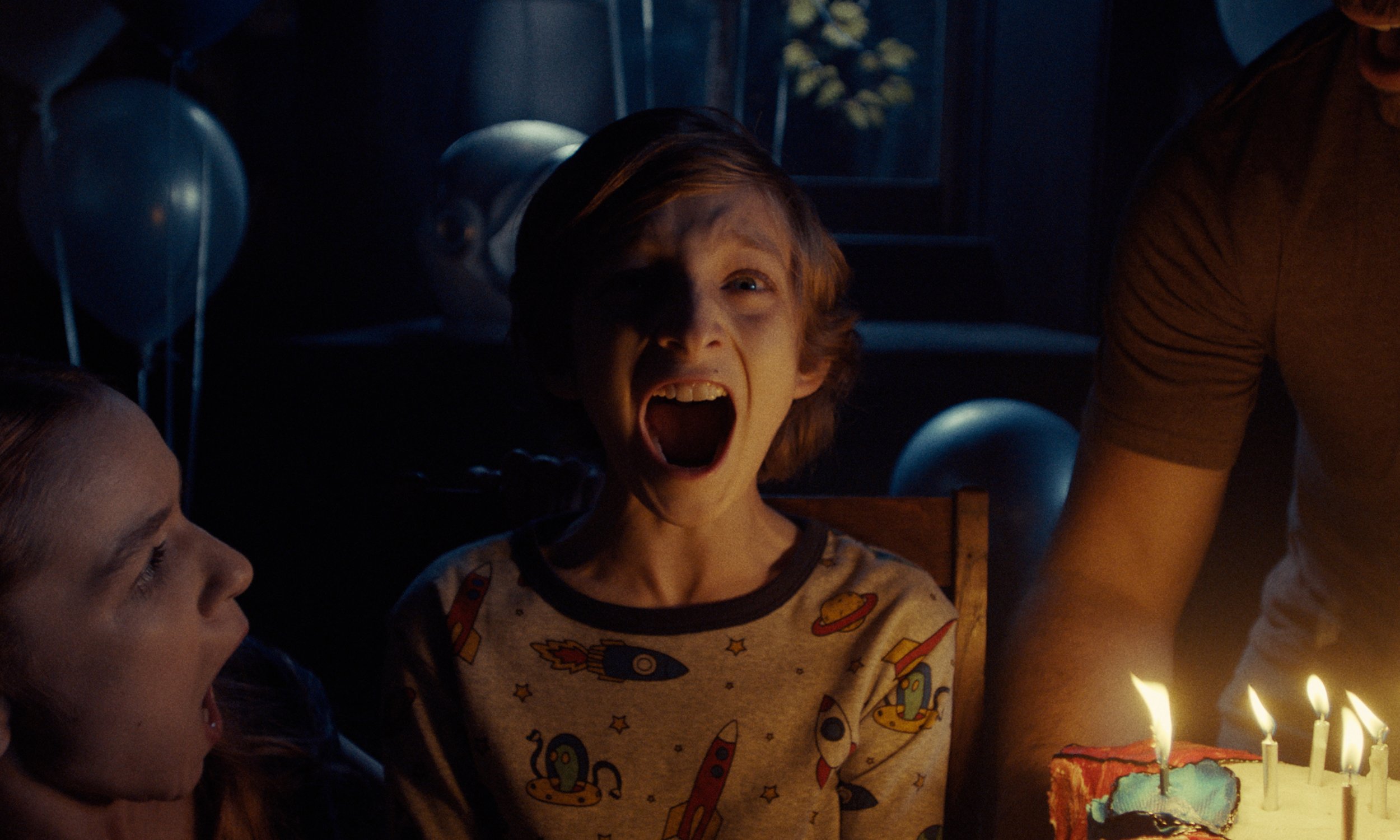[Film Review] Spoonful of Sugar (2022)

If the title and the poster didn’t already make this indication, this glorious chaotic film paints a clear, symbolic relationship between the mouth and its search for a substance to, in turn, disturb it.
Horror isn’t oblivious in its attempt to twist nurturing and motherly aspects to truly unveil how such relationships and dynamics are not without possible macabre intentions. This focus is evident in the opening scene of Millicent, the antagonist of the film, waking up from a bus ride and fixating on a mother nursing her young, a foreshadowing of the fixation Millicent will have with a family that she doesn’t know have dark intentions for her.
Spoonful of Sugar is a Shudder original film that combines an assortment of horror elements that keeps you speculating about the narrative's intent. However, it is this displacement that takes you on a journey of envious eroticism, family secrets, and LSD hallucinations. Millicent is an undergraduate student that is “taking a semester off” from university to participate in a micro dosing LSD experimental treatment but masks this by being hired as a caretaker for a young boy, Johnny, who has such severe allergies that his own need to be nurtured is extremely demanding on his parents.
LISTEN TO OUR HORROR PODCAST!
![[Ghouls Podcast] Maniac (2012) with Zoë Rose Smith and Iona Smith](https://images.squarespace-cdn.com/content/v1/5fe76a518d20536a3fbd7246/1696356006789-NYTG9N3IXCW9ZTIJPLX2/maniac.jpg)
Throughout the film, Millicent is presented as an individual that is actively and passively challenging the family matriarch, Rebecca, as she already deals with tensions from her philandering husband, Jacob, and Johnny’s illness. The disruption of Rebecca’s ability to care, given the pressure placed upon her, allows Millicent to see an opportunity to replace her, and Millicent’s irrational behavior is heightened by her LSD micro dosages.
Although the imagery and performances of the characters were captivating, the narrative clay would have benefited from a little more molding at certain points and this in turn would have better informed the justification of the plot twist ending. Nevertheless, the distortion of reality, influenced by Millicent’s LSD abuse experiences, within the film is a compelling component of the filmmaking style. Without spoiling too much from the film, we see Millicent and Rebecca have a long-needed confrontation with each other which ignites the revelation that Millicent isn’t the true hidden villain in this narrative (cemented by other murderous actions she committed prior) but Rebecca’s son. This twist sheds new light on the parents, especially Rebecca who struggles to maintain her motherly role with her son, but also on how Johnny has taken over the attention and passion between Rebecca and Jacob.

The mouth symbolism is one aspect of the film that piques interest as a viewer, challenging the audience's ability to see how nurturing aspects are muddled. For Millicent, the LSD micro dosing that is supposed to elevate her psychosis is abused and motivates her own nurture towards Rebecca’s family she intends to disrupt. Rebecca and Jacob attempt to keep up their passion and connection in moments of intimate cunnilingus and phone role-playing is disrupted by Johnny’s illness and even tantrums that further deconstruct the nuclear family order within their household. To add to this, Johnny being nonverbal is an indication of Rebecca’s inability to feel like a good mother, her son not being able to talk to her, but then when he starts to call Millicent “mom” out loud this escalates the tension between Rebecca and Millicent. Overall, the visual symbolism of the mouth is a huge indicator of the dynamics at play that don’t require an over-explaining which makes the twist at the end even more satisfying.


![[Ghouls Podcast] Ghouls Watch: Bucket List of the Dead, Blood Drive, Candy Land & more](https://images.squarespace-cdn.com/content/v1/5fe76a518d20536a3fbd7246/1696261000263-58VQFOVWPE363OFGP7RF/GHOULS+WATCH.jpg)
![[Ghouls Podcast] Tender Is The Flesh with Zoë Rose Smith, Bel Morrigan and Liz Bishop](https://images.squarespace-cdn.com/content/v1/5fe76a518d20536a3fbd7246/1693769261264-MS4TS4Z4QC1N15IXB4FU/Copy+of+%5BJuly%5D+Antiviral%2C+possesoor+and+infinity+pool.jpg)
![[Ghouls Podcast] Antiviral, Possessor & Infinity Pool with Zoë Rose Smith, Amber T and Iona Smith](https://images.squarespace-cdn.com/content/v1/5fe76a518d20536a3fbd7246/1691238787263-XYRKXW2Z7RWI9AY2V2GX/%5BJuly%5D+Antiviral%2C+possesoor+and+infinity+pool+%281%29.jpg)
![[Ghouls Podcast] Ghouls Watch: Body Horror Recommendations](https://images.squarespace-cdn.com/content/v1/5fe76a518d20536a3fbd7246/1691238687847-L9U434I1U4HZ3QMUI3ZP/%5BJuly%5D+Ghouls+Watch+-+Website+%281%29.jpg)
![[Ghouls Podcast] The Last House on the Left (2009) with Zoë Rose Smith and Jerry Sampson](https://images.squarespace-cdn.com/content/v1/5fe76a518d20536a3fbd7246/1687863043713-54DU6B9RC44T2JTAHCBZ/last+house+on+the+left.jpg)
![[Ghouls Podcast] Ghouls Watch: Bones and All, Suitable Flesh, The Human Centipede & more](https://images.squarespace-cdn.com/content/v1/5fe76a518d20536a3fbd7246/1687855203348-7R2KUSNR6TORG2DKR0JF/%5BJune%5D+Ghouls+Watch+-+Website.jpg)
![[Ghouls Podcast] 3 Original vs. Remake Horror Films with Rebecca McCallum & Kim Morrison](https://images.squarespace-cdn.com/content/v1/5fe76a518d20536a3fbd7246/1685286663069-0Q5RTYJRNWJ3XKS8HXLR/%5BJune%5D+Original+vs.+Remake+Horror+Films.png)
![[Ghouls Podcast] Ghouls Watch: The Devil’s Candy, Morgana, Dead Ringers & more](https://images.squarespace-cdn.com/content/v1/5fe76a518d20536a3fbd7246/1685284429090-5XOOBIOI8S4K6LP5U4EM/%5BMay%5D+Ghouls+Watch+-+Website.png)
![[Ghouls Podcast] The Bay (2012) with Ariel Powers-Schaub & Amber T](https://images.squarespace-cdn.com/content/v1/5fe76a518d20536a3fbd7246/1684751617262-6K18IE7AO805SFPV0MFZ/The+Bay+website+image.jpg)
![[Ghouls Podcast] The Ruins (2008) with Ash Millman & Zoë Rose Smith](https://images.squarespace-cdn.com/content/v1/5fe76a518d20536a3fbd7246/1684076097566-BE25ZBBECZ7Q2P7R4JT4/The+Ruins.jpg)
![[Ghouls Podcast] Picnic at Hanging Rock (1975) with Zoë Rose Smith & Rebecca McCallum](https://images.squarespace-cdn.com/content/v1/5fe76a518d20536a3fbd7246/1682536446302-I2Y5IP19GUBXGWY0T85V/picnic+at+hanging+rock.jpg)
![[Ghouls Podcast] Ghouls Watch: Deathproof, Child’s Play, Ghostwatch & more](https://images.squarespace-cdn.com/content/v1/5fe76a518d20536a3fbd7246/1682447065521-DWF4ZNYTSU4NUVL85ZR0/ghouls+watch.png)
![[Ghouls Podcast] 5 Coming-of-Age Horror Film Recommendations](https://images.squarespace-cdn.com/content/v1/5fe76a518d20536a3fbd7246/1681418402835-EMZ93U7CR3BE2AQ1DVH4/S2+EP5.png)
![[Ghouls Podcast] Psychotic Women in Horror with Zoë Rose Smith & Mary Wild](https://images.squarespace-cdn.com/content/v1/5fe76a518d20536a3fbd7246/1678635495097-X9TXM86VQDWCQXCP9E2L/Copy+of+Copy+of+Copy+of+GHOULS+PODCAST+THE+LOVED+ONES.jpg)
![[Ghouls Podcast] Good For Her Horror Film Recommendations](https://images.squarespace-cdn.com/content/v1/5fe76a518d20536a3fbd7246/1678634497037-W441LL37NW0092IYI57D/Copy+of+Copy+of+GHOULS+PODCAST+THE+LOVED+ONES.jpg)
![[Ghouls Podcast] Ghouls Watch: Severance, Run Sweetheart Run, Splice & more](https://images.squarespace-cdn.com/content/v1/5fe76a518d20536a3fbd7246/1677589685406-YZ9GERUDIE9VZ96FOF10/Copy+of+GHOULS+PODCAST+THE+LOVED+ONES+%281%29.jpg)
![[Ghouls Podcast] Nekromantik with Zoë Rose Smith & Rebecca McCallum](https://images.squarespace-cdn.com/content/v1/5fe76a518d20536a3fbd7246/1677422649033-Z4HHPKPLUPIDO38MQELK/feb+member+podcast.jpg)
![[Ghouls Podcast] The Loved Ones (2009) with Liz Bishop](https://images.squarespace-cdn.com/content/v1/5fe76a518d20536a3fbd7246/1676369735666-56HEK7SVX9L2OTMT3H3E/GHOULS+PODCAST+THE+LOVED+ONES.jpg)
![[Ghouls Podcast] Terrifier (2016) & Terrifier 2 (2022) with Janine Pipe](https://images.squarespace-cdn.com/content/v1/5fe76a518d20536a3fbd7246/1674478017541-0DHH2T9H3MVCAMRBW1O1/_PODCAST+NO+IMAGE+2023+EP+4+%282%29.jpg)
![[Ghouls Podcast] Final Destination 5 & Wrap-up with Ariel Powers-Schaub & Iona Smith](https://images.squarespace-cdn.com/content/v1/5fe76a518d20536a3fbd7246/1672841326335-WER2JXX7WP6PO8JM9WB2/PODCAST+BONUS+2023+%284%29.jpg)
![[Ghouls Podcast] Final Destination 3 & 4 with Ariel Powers-Schaub & Iona Smith](https://images.squarespace-cdn.com/content/v1/5fe76a518d20536a3fbd7246/1672841151148-U152EBCTCOP4MP9VNE70/PODCAST+BONUS+2023+%283%29.jpg)
![[Ghouls Podcast] Krampus (2015) with Megan Kenny & Rebecca McCallum](https://images.squarespace-cdn.com/content/v1/5fe76a518d20536a3fbd7246/1672839790368-VYX6LIWC5NVVO8B4CINW/_PODCAST+NO+IMAGE+2023+EP+17.jpg)
![[Ghouls Podcast] Soho Horror Film Review with Hannah Ogilvie & Caitlyn Downs](https://images.squarespace-cdn.com/content/v1/5fe76a518d20536a3fbd7246/1672840392291-XQGQ94ZN9PTC4PK9DTN1/_PODCAST+NO+IMAGE+2023+EP+16.jpg)
![[Ghouls Podcast] Final Destination 1 & 2 with Ariel Powers-Schaub & Iona Smith](https://images.squarespace-cdn.com/content/v1/5fe76a518d20536a3fbd7246/1672841181605-5JOOW88EDHGQUXSRHVEF/PODCAST+BONUS+2023+%282%29.jpg)
![[Ghouls Podcast] The Borderlands (2013) with Jen Handorf](https://images.squarespace-cdn.com/content/v1/5fe76a518d20536a3fbd7246/1672839985316-KPLOVA9NGQDAS8Z6EIM9/_PODCAST+NO+IMAGE+2023+EP+15.jpg)
![[Film Review] Return to Silent Hill (2026)](https://images.squarespace-cdn.com/content/v1/5fe76a518d20536a3fbd7246/1769672582439-C8RQWP3CYUW1JX4ZRNLE/RETURN+TO+SILENT+HILL.jpg)
![[Film Review] Flights of Reverie (2025)](https://images.squarespace-cdn.com/content/v1/5fe76a518d20536a3fbd7246/1769111579457-CTUW03G3J34P6SFRWWEM/flights-of-reverie-filmstill-ornithologist-berlin-li-wallis06.jpg)
![[Film Review] Confessions in Static (2025)](https://images.squarespace-cdn.com/content/v1/5fe76a518d20536a3fbd7246/1768397467245-3KOF3LUBRDQVJ8QVDONA/Confessions_Key_Alternate_1920x1080.png)
![[Film Review] Stalker (2025)](https://images.squarespace-cdn.com/content/v1/5fe76a518d20536a3fbd7246/1768232505839-TS9K7YBLOXNQML8PUWTP/Screenshot+2026-01-12+at+15.17.49.png)
![[Film Review] Bone Lake (2025)](https://images.squarespace-cdn.com/content/v1/5fe76a518d20536a3fbd7246/1768151214859-U1AUN7JALKRK4W5NGJVH/Andra+Nechita+and+Maddie+Hasson+in+Bone+Lake+%28Signature+Entertainment%29+1.jpg)
![[Film Review] 28 Years Later: The Bone Temple (2026)](https://images.squarespace-cdn.com/content/v1/5fe76a518d20536a3fbd7246/1768152692285-7TK6SN62JY4H3TJDYABP/The+Bone+temple.jpg)













